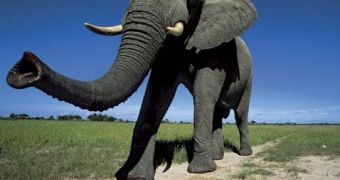Not all the people are perceived in the same manner by elephants. A Maasai warrior clothing can induce dread in African elephants, driving them to the safety of tall grasses. These war shepherds occasionally spear elephants as a sign of virility (in fact, a Maasai is not considered a man till he has not killed a lion). In the case of Kamba men, the reaction is much milder.
"They think about people in the way you and I think about people. There are different types [of people] and they have different characteristic behaviors and-if I was an elephant-very different implications, some of them being the type who occasionally spear you. Elephants categorize each group of people differently." said co-author Richard Byrne, a psychologist at the University of St. Andrews in the U.K.
The team at St. Andrews and the Kenya-based Amboseli Trust found that the huge beasts can distinguish the danger degree caused by different ethnic groups.
"The Maasai are pastoralists-they herd cattle and thus may pick up cattle odors. In addition, they wear body decorations of ochre and sheep fat that have a distinctive smell." said Byrne.
The Maasai eat mainly milk and cattle, while Kamba people have a diet based on meat and vegetables and these diet differences bring about different body odors.
Elephants in the field were exposed to red garments worn by a Maasai, a Kamba, or no one.
"The elephants had never encountered the men who had worn the scented clothes. And the clothes were kept out of sight, so smell was the only way for the elephants to detect them. Both the Maasai and Kamba scents caused the elephants to pick up their trunks and point them towards the clothes to investigate. The animals also bunched together, a behavior that signals concern," said Byrne.
When elephants picked up the Kamba scent, they walked away about 150 ft (46 m) and started to completely relax after a few minutes and to graze.
"In the case of the Maasai scent, they would head off directly downwind, sometimes almost running, and often wouldn't stop for a kilometer [0.6 mile]. Even when they did stop, they were still bunched together, sniffing the air, and took several minutes even when they were a kilometer away to relax enough to start feeding. So it was a very strong effect." said Byrne. In a second test, the team presented to the elephants a typical white Kamba garment and a red Masaai garment, but both were scentless, as they had never been worn.
White is more conspicuous for the elephants; still they have a stronger reaction to red, a drab color for them.
"It was almost as if the fact that there wasn't a Maasai there-otherwise they could have smelt him-allowed them to express their real feelings, which was not very polite. They didn't like them," he said.
Elephants could associate Masaai to personal memories of a family member being injured or killed by a Masaai spear, but the reaction was the same in all.
"So we think the fear was probably socially transmitted among the elephants," Byrne said.
"The findings may spur further research into using the elephant sense of smell as a way to reduce conflicts between humans and elephants. Creating odor cues that keep elephants away might certainly be extremely helpful," said Josh Plotnik at Emory University in Atlanta, Georgia, who studies elephant behavior.

 14 DAY TRIAL //
14 DAY TRIAL //